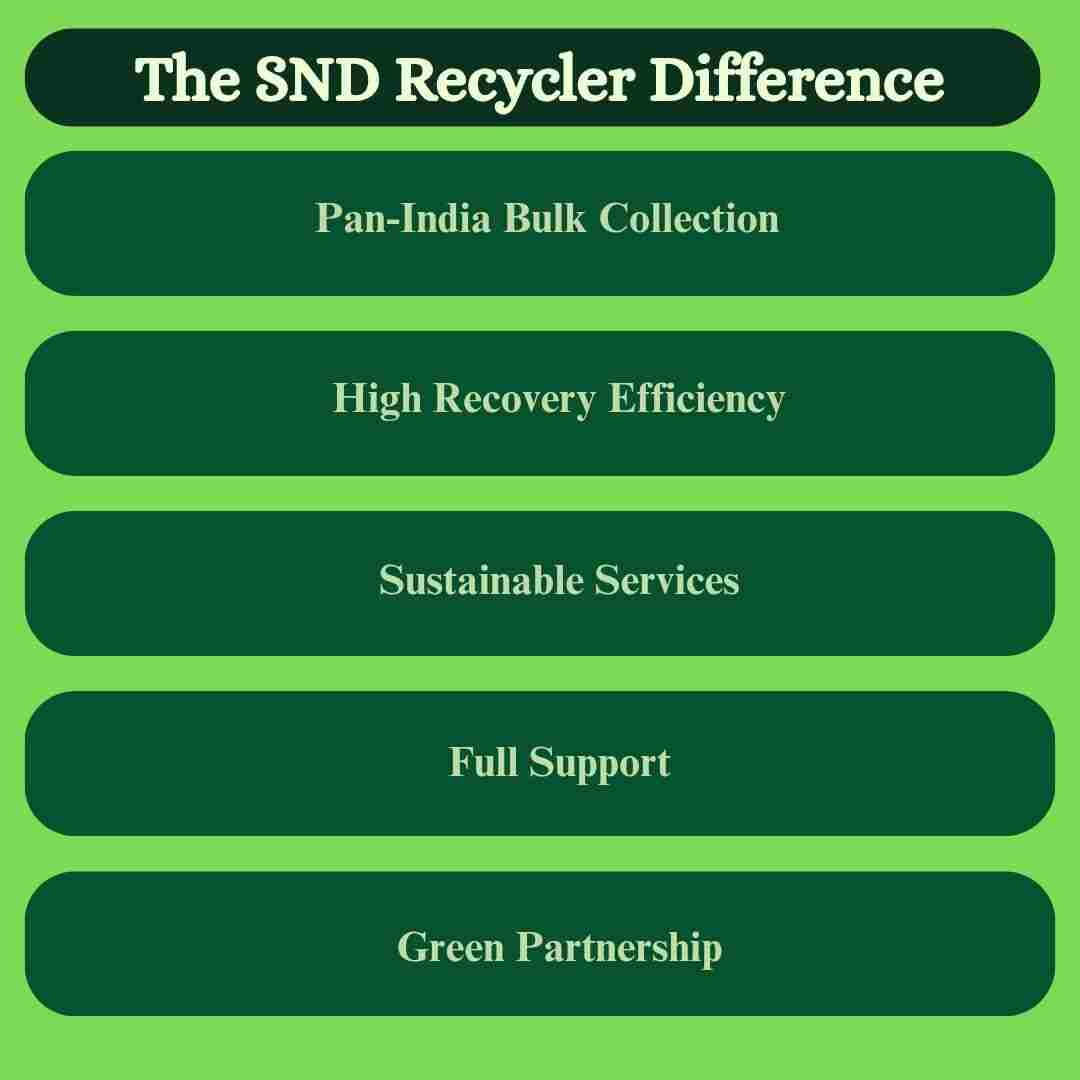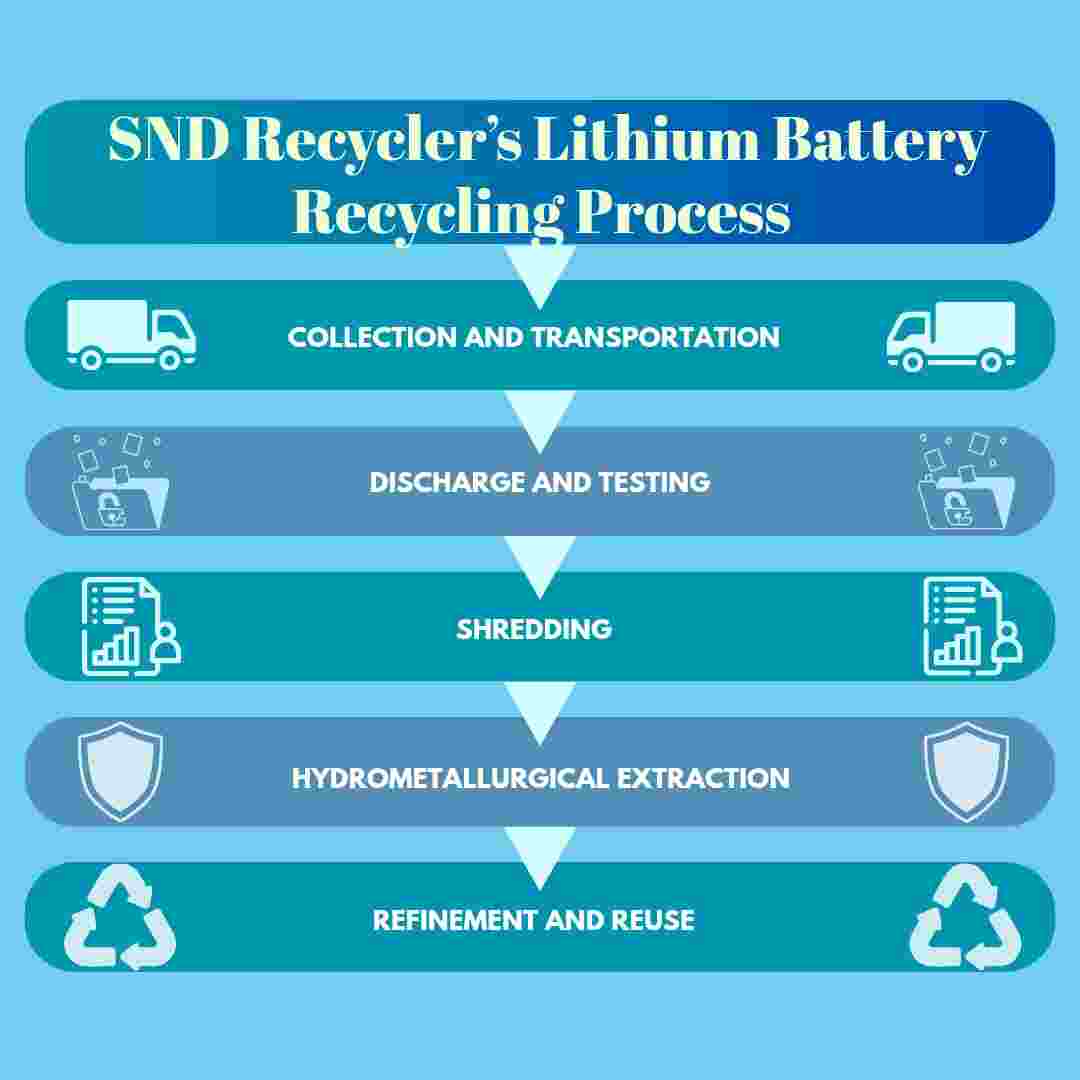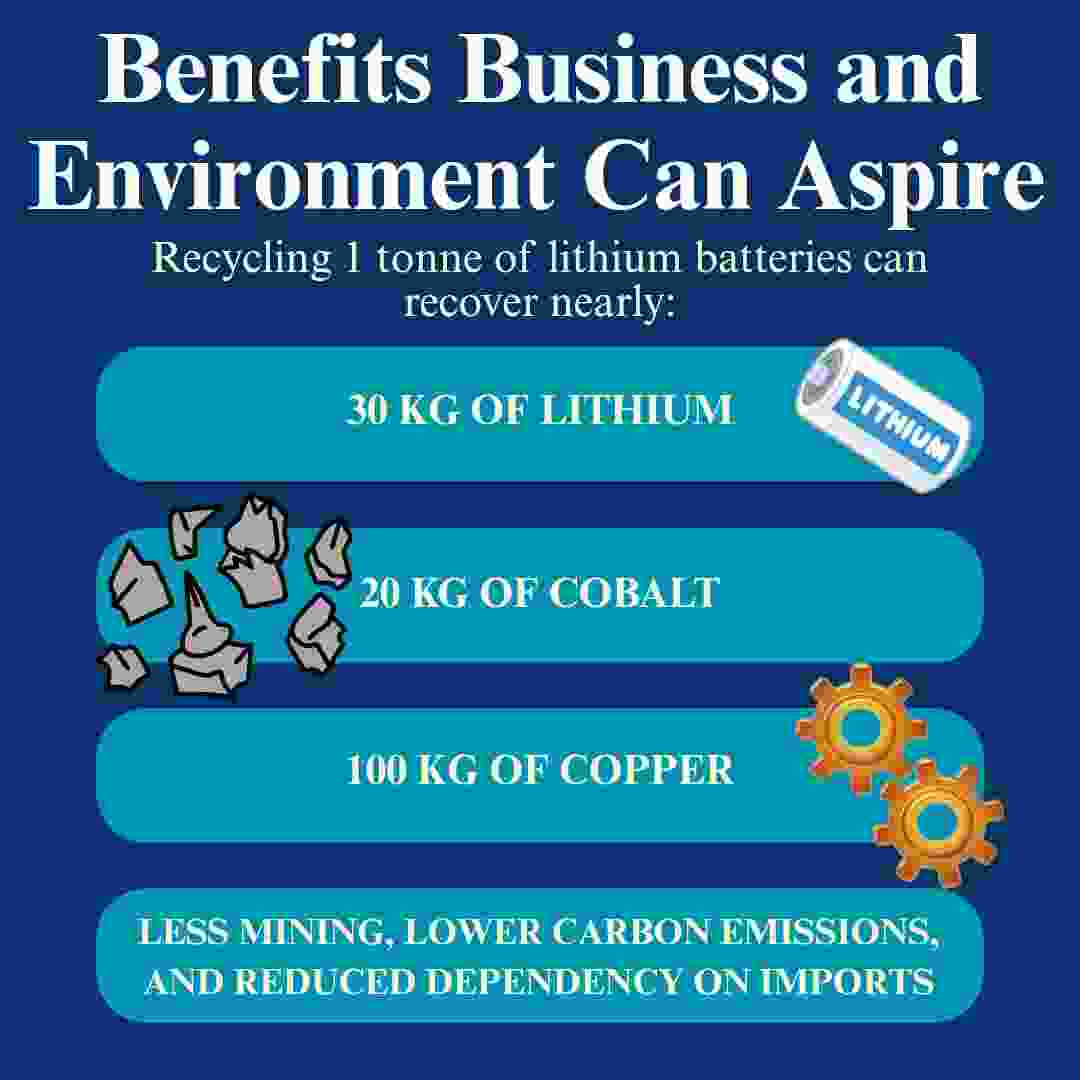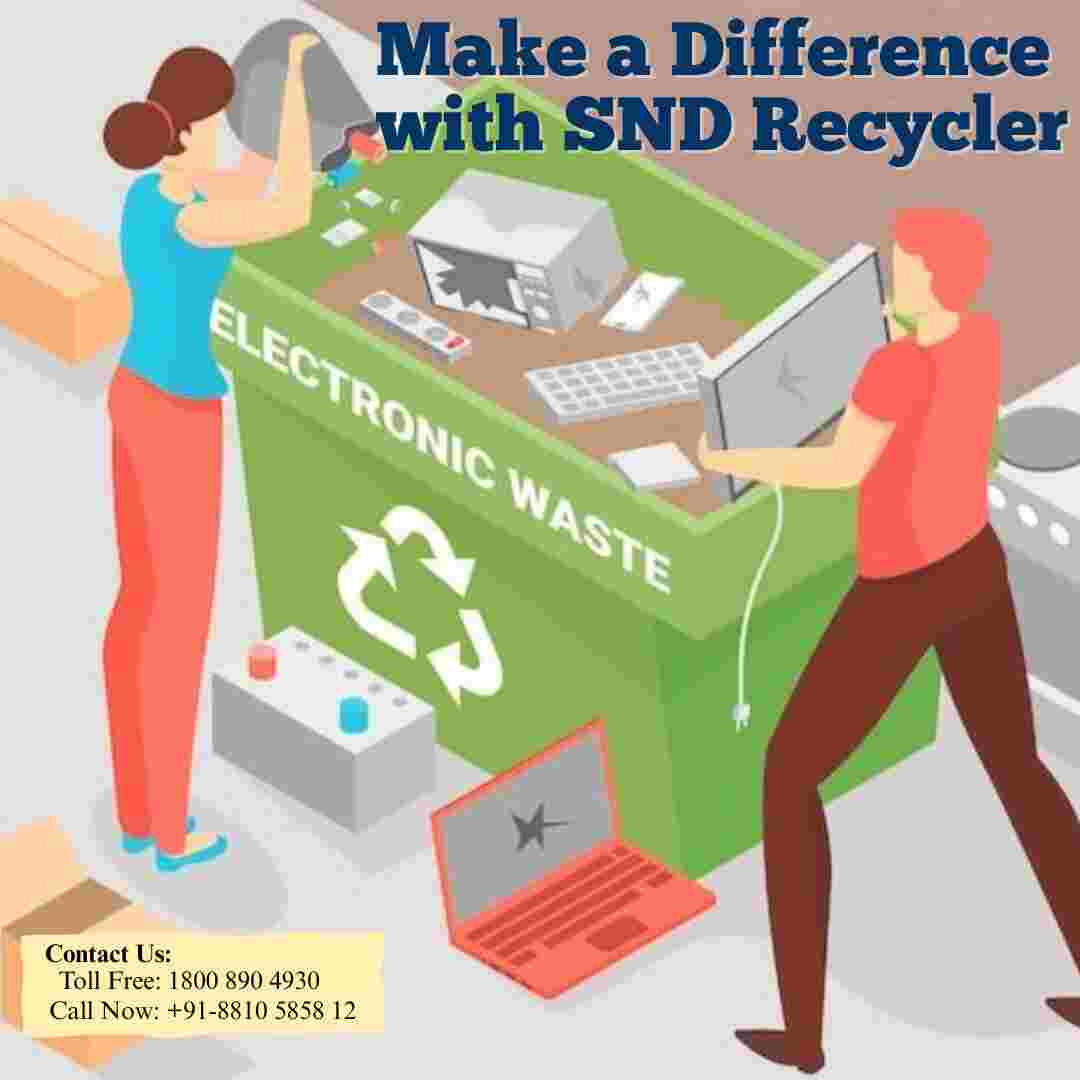Pan-India Lithium Battery Recycling by SND Recycler
Explore how lithium battery recycling reduces pollution, recovers metals, and supports India’s clean energy goals. Partner with SND Recycler today.

Why Responsible Lithium Battery Recycling Is a Priority for SND Recycler
There are massive stacks of dead batteries piled up at landfills from home UPS units, electric bikes, laptops, telecom systems to solar energy storage. Each of them carries metals and chemicals that, if mismanaged, can poison soil, contaminate water, and even catch fire at times. But if handled properly, they are treasure chests of lithium, cobalt, nickel, and graphite, all set to fuel the next generation of batteries. That is why lithium battery recycling is crucial to us.
We are a bulk e-waste recycling company operating pan-India, and we have oriented our services around responsible, scalable lithium battery recycling.
In this blog, you will find answers, real data, actionable guidance, and a clear vision of how we help businesses, institutions, and consumers turn battery waste into a resource.
Table of Contents
- The Demanding Challenge
- SND Recycler’s Lithium Battery Recycling Process
- Transparency and Traceability
- Benefits Business and Environment Can Aspire
- The SND Recycler Difference
- Building a Greener India
- FAQs on Lithium Battery Recycling by SND Recycler
The Demanding Challenge
India’s demand for lithium batteries has seen a surge in recent years. Be it smartphones, solar plants, or EVs, lithium batteries are everywhere. Industry projections estimate India’s lithium battery demand will cross 230 GWh by 2030. Amidst this rising supply, one major aspect is overlooked: the waste it generates.
A study by the Central Pollution Control Board reveals India produces over 3 million tonnes of e-waste yearly, and a growing portion of this is made up of lithium batteries. Yet only 5% or maybe less of it is scientifically processed and recycled.
These improper disposal, however, can lead to multiple risks: fires in waste dumps, chemical leaching, and irreversible soil contamination. But the metals inside these batteries, such as lithium, cobalt, nickel, and copper, can all be recovered and reused. That’s why lithium battery recycling has become one of the most important aspects in the sustainability industries in India.
SND Recycler’s Lithium Battery Recycling Process
We have established a detailed closed-loop recycling process that ensures maximum recovery and minimum impact. Here’s how it works:
- Collection and Transportation: Our team runs pan-India collection drives with proper documentation. Batteries are stored in certified containers designed for lithium-ion waste and shipped safely.
- Discharge and Testing: Each batch is checked for residual energy. Batteries are discharged in controlled environments to eliminate fire risks.
- Shredding: Our trained team dismantles battery packs and cells, separating plastics, aluminum, and copper for recycling.
- Hydrometallurgical Extraction: Using chemical leaching and purification, we recover lithium, cobalt, nickel, and manganese with over 90% efficiency.
- Refinement and Reuse: Extracted metals are purified to industrial-grade quality and supplied back to manufacturers for new battery production.
Transparency and Traceability
We follow the Battery Waste Management Rules 2022 and ensure the availability of complete traceability for every lithium battery we handle. Clients receive collection receipts, recycling certificates, and recovery reports as proof that their waste is processed responsibly.
Our facilities are equipped with advanced safety systems, fire suppression, and continuous air monitoring. Every employee undergoes technical and safety training to ensure precision in every step.

Benefits Business and Environment Can Aspire
Recycling 1 tonne of lithium batteries can recover nearly 30 kg of lithium, 20 kg of cobalt, and 100 kg of copper. That means less mining, lower carbon emissions, and reduced dependency on imports.
India currently imports almost all its lithium and cobalt. With recycling, we can create a domestic secondary supply chain, strengthening both the economy and sustainability goals.
For companies, lithium battery recycling offers dual benefits: compliance and cost recovery.

The SND Recycler Difference
- Pan-India Bulk Collection: Our logistics network covers every city to town to villages.
- High Recovery Efficiency: Advanced extraction processes ensure maximum metal reclamation.
- Sustainable Services: Zero-landfill and zero-liquid-discharge approach ensures minimal environmental footprint.
- Full Support: From pickup to documentation, clients get complete transparency.
- Green Partnership: We collaborate with EV manufacturers, solar companies, and government programs to create structured recycling ecosystems.

Building a Greener India
When we look at the growing mountain of e-waste in India, our team does not see it as a crisis anymore. We see a massive opportunity to bring in the change.
Every lithium battery we recycle is one step toward a greener economy and better tomorrow, where everything is transformed.
SND Recycler is proud to be part of that transformation. And we’re inviting every business, manufacturer, and individual to join us. Because the future of power depends not only on how we use energy but also on how we return it to the earth.
FAQs on Lithium Battery Recycling by SND Recycler
Q1. What happens if I throw lithium batteries in regular trash?
Lithium batteries can catch fire or leak harmful chemicals. In landfills, they react with moisture and release toxins that contaminate soil and groundwater. Always send them to authorized recyclers like SND Recycler.
Q2. Is lithium battery recycling safe?
Yes: when done scientifically. We follow certified processes for discharge, dismantling, and material recovery to eliminate fire or chemical risks. Every step is monitored under safety standards.
Q3. Can lithium from old batteries be reused in new ones?
Absolutely. Recycled lithium and cobalt are purified to industry-grade quality and reused in new cell manufacturing. This reduces the need for fresh mining and lowers the cost of production.
Q4. Does recycling make financial sense for businesses?
Yes. Through bulk lithium battery recycling, you not only meet environmental compliance but also recover valuable metals that offset your recycling costs. Some clients even earn from recovered materials.
Q5. What is the difference between informal and formal recycling?
Informal recycling often involves unsafe dismantling and open burning, which harm both people and the planet. Formal recycling, like ours at SND Recycler, ensures environmental compliance, worker safety, and complete traceability.
Q6. How do I know my batteries were truly recycled?
We issue detailed recycling certificates and material recovery reports — complete with batch tracking — so clients know exactly how their lithium battery waste was processed.
Q7. Can SND Recycler handle other e-waste too?
Yes. Apart from lithium battery recycling, we manage bulk e-waste such as servers, IT equipment, and electrical scrap. We provide pan-India pickup and recycling services with complete documentation.
Electronic Waste Recycling
READY TO SPEAK WITH A RECYCLING SPECIALIST?
At S&D Recycler , we make it easy for organizations to do the RIGHT thing with their End of Life Electronic (EOL) IT Equipment. Honest, reliable & secure electronic waste recycling services.
